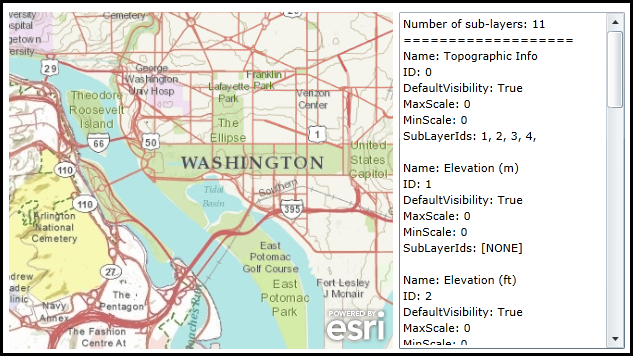| Visual Basic (Declaration) | |
|---|---|
Public ReadOnly Property Layers As LayerInfo() | |
| C# | |
|---|---|
public LayerInfo[] Layers {get;} | |
Each LayerInfo in the array will provide the default visibility, unique ID, name, min/max scales, and a set of sub-layer IDs (if present).
Do not confuse the results of a Map.Layers Property (which returns a LayerCollection object) with the ArcGISDynamicMapServicelayer.Layers Property (which return a LayerInfo() object). A LayerCollection is an ObservableCollection of Layer objects used in displaying geographic information via symbols and text.
How to use:
When the application loads the ArcGISDynaimcMapServiceLayer.Initialized Event will display information about the ArcGISDynamicMapServiceLayer.Layers Property in the TextBox.
The XAML code in this example is used in conjunction with the code-behind (C# or VB.NET) to demonstrate the functionality.
The following screen shot corresponds to the code example in this page.

| XAML |  Copy Code Copy Code |
|---|---|
<Grid x:Name="LayoutRoot"> <!-- Add a Map Contol. Zoom to the Washington, DC area. --> <esri:Map Background="White" HorizontalAlignment="Left" Margin="12,131,0,0" Name="Map1" VerticalAlignment="Top" WrapAround="True" Height="337" Width="384" Extent="-8580189,4701989,-8572263,4708946"> <esri:Map.Layers> <esri:LayerCollection> <!-- Add an ArcGISDynamicMapServiceLayer; it has multiple sub-layers. Wire up an Initialized Event with code-behind. --> <esri:ArcGISDynamicMapServiceLayer ID="World_Topo_Map" Initialized="ArcGISDynamicMapServiceLayer_Initialized" Url="http://server.arcgisonline.com/ArcGIS/rest/services/World_Topo_Map/MapServer" /> </esri:LayerCollection> </esri:Map.Layers> </esri:Map> <!-- Add a TextBox to display ArcGISDynamicMapServiceLayers.Layers Property information. --> <TextBox Height="337" HorizontalAlignment="Left" Margin="402,131,0,0" Name="TextBox_Layers" Width="226" VerticalAlignment="Top" HorizontalScrollBarVisibility="Hidden" VerticalScrollBarVisibility="Visible" /> <!-- Provide the instructions on how to use the sample code. --> <TextBlock Height="52" HorizontalAlignment="Left" Name="TextBlock1" VerticalAlignment="Top" Width="756" TextWrapping="Wrap" Text="When the application loads the ArcGISDynaimcMapServiceLayer.Initialized Event will display information about the ArcGISDynamicMapServiceLayer.Layers Property in the TextBox." /> </Grid> | |
| C# |  Copy Code Copy Code |
|---|---|
private void ArcGISDynamicMapServiceLayer_Initialized(object sender, System.EventArgs e) { // Get the ArcGISDynamicMapServiceLayer from the Map Control. ESRI.ArcGIS.Client.ArcGISDynamicMapServiceLayer myArcGISDynamicMapServiceLayer = null; myArcGISDynamicMapServiceLayer = (ESRI.ArcGIS.Client.ArcGISDynamicMapServiceLayer)(Map1.Layers["World_Topo_Map"]); // Get the ArcGISDynamicMapServiceLayer.Layers Property information (it will be an Array of LayerInfo objects). ESRI.ArcGIS.Client.LayerInfo[] myLayerInfo = myArcGISDynamicMapServiceLayer.Layers; // Create a StringBuilder to display the ArcGISDynamicMapServiceLayer.Layers Property information in a TextBox. System.Text.StringBuilder myStringBuilder = new System.Text.StringBuilder(); // Add the count of LayerInfo objects to the StringBuilder. myStringBuilder.Append("Number of sub-layers: " + myLayerInfo.Length.ToString() + Environment.NewLine); myStringBuilder.Append("===================" + Environment.NewLine); // Loop through each LayerInfo object. foreach (ESRI.ArcGIS.Client.LayerInfo oneLayerInfo in myLayerInfo) { // Set each of the Properties in the LayerInfo object to corresponding variables. bool myDefaultVisibility = oneLayerInfo.DefaultVisibility; int myID = oneLayerInfo.ID; double myMaxScale = oneLayerInfo.MaxScale; double myMinScale = oneLayerInfo.MinScale; string myName = oneLayerInfo.Name; int[] mySubLayerIds = oneLayerInfo.SubLayerIds; // Append the information in the LayerInfo variables to the StringBuilder. myStringBuilder.Append("Name: " + myName + Environment.NewLine); myStringBuilder.Append("ID: " + myID.ToString() + Environment.NewLine); myStringBuilder.Append("DefaultVisibility: " + myDefaultVisibility.ToString() + Environment.NewLine); myStringBuilder.Append("MaxScale: " + myMaxScale.ToString() + Environment.NewLine); myStringBuilder.Append("MinScale: " + myMinScale.ToString() + Environment.NewLine); // The LayerInfo.SubLayerIds could return either Nothing/null or an Array of Integer values for // the sub-layer ID's. Add extra code logic to display the LayerInfo.SubLayerIds accordingly. string mySubLayerIdsString = ""; if (mySubLayerIds != null) { foreach (int oneSubLayerId in mySubLayerIds) { mySubLayerIdsString = mySubLayerIdsString + oneSubLayerId.ToString() + ", "; } } else { mySubLayerIdsString = "[NONE]"; } myStringBuilder.Append("SubLayerIds: " + mySubLayerIdsString + Environment.NewLine + Environment.NewLine); } // Display all of the stuff in the StringBuilder in the TextBox. TextBox_Layers.Text = myStringBuilder.ToString(); } | |
| VB.NET |  Copy Code Copy Code |
|---|---|
Private Sub ArcGISDynamicMapServiceLayer_Initialized(sender As System.Object, e As System.EventArgs) ' Get the ArcGISDynamicMapServiceLayer from the Map Control. Dim myArcGISDynamicMapServiceLayer As ESRI.ArcGIS.Client.ArcGISDynamicMapServiceLayer myArcGISDynamicMapServiceLayer = CType(Map1.Layers("World_Topo_Map"), ESRI.ArcGIS.Client.ArcGISDynamicMapServiceLayer) ' Get the ArcGISDynamicMapServiceLayer.Layers Property information (it will be an Array of LayerInfo objects). Dim myLayerInfo() As ESRI.ArcGIS.Client.LayerInfo = myArcGISDynamicMapServiceLayer.Layers ' Create a StringBuilder to display the ArcGISDynamicMapServiceLayer.Layers Property information in a TextBox. Dim myStringBuilder As New System.Text.StringBuilder ' Add the count of LayerInfo objects to the StringBuilder. myStringBuilder.Append("Number of sub-layers: " + myLayerInfo.Length.ToString + vbCrLf) myStringBuilder.Append("===================" + vbCrLf) ' Loop through each LayerInfo object. For Each oneLayerInfo As ESRI.ArcGIS.Client.LayerInfo In myLayerInfo ' Set each of the Properties in the LayerInfo object to corresponding variables. Dim myDefaultVisibility As Boolean = oneLayerInfo.DefaultVisibility Dim myID As Integer = oneLayerInfo.ID Dim myMaxScale As Double = oneLayerInfo.MaxScale Dim myMinScale As Double = oneLayerInfo.MinScale Dim myName As String = oneLayerInfo.Name Dim mySubLayerIds() As Integer = oneLayerInfo.SubLayerIds ' Append the information in the LayerInfo variables to the StringBuilder. myStringBuilder.Append("Name: " + myName + vbCrLf) myStringBuilder.Append("ID: " + myID.ToString + vbCrLf) myStringBuilder.Append("DefaultVisibility: " + myDefaultVisibility.ToString + vbCrLf) myStringBuilder.Append("MaxScale: " + myMaxScale.ToString + vbCrLf) myStringBuilder.Append("MinScale: " + myMinScale.ToString + vbCrLf) ' The LayerInfo.SubLayerIds could return either Nothing/null or an Array of Integer values for ' the sub-layer ID's. Add extra code logic to display the LayerInfo.SubLayerIds accordingly. Dim mySubLayerIdsString As String = "" If mySubLayerIds IsNot Nothing Then For Each oneSubLayerId As Integer In mySubLayerIds mySubLayerIdsString = mySubLayerIdsString + oneSubLayerId.ToString + ", " Next Else mySubLayerIdsString = "[NONE]" End If myStringBuilder.Append("SubLayerIds: " + mySubLayerIdsString + vbCrLf + vbCrLf) Next ' Display all of the stuff in the StringBuilder in the TextBox. TextBox_Layers.Text = myStringBuilder.ToString End Sub | |
Target Platforms: Windows XP Professional, Windows Server 2003 family, Windows Vista, Windows Server 2008 family, Windows 7, Windows 8




